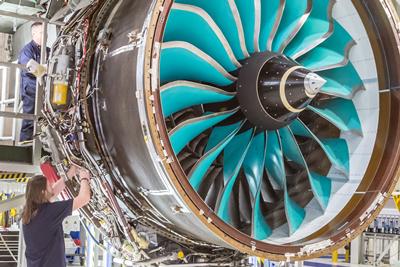Southampton to shape the future of aircraft noise in Rolls-Royce University Technology Centre

A pioneering research collaboration between the University of Southampton and Rolls-Royce is developing noise technologies for the next generation of aeroplane engines.
Engineers from the Rolls-Royce University Technology Centre (UTC), based in Southampton’s Institute for Sound and Vibration Research, have strengthened the organisations’ longstanding partnership as part of the £11.2 million FANTASIA programme.
The Future Noise Technologies and Systems Integration Analytics project follows work from the ACAPELLA collaboration on the development of the UltraFan engine. The world’s largest aero-engine is designed with a large diameter fan that improves aircraft propulsion efficiency to help redefine sustainable air travel for decades to come.
For two decades, the University has been Rolls-Royce’s main research partner for aircraft engine and airframe noise.
Professor Alec Wilson, Director of the UTC, says: “Aircraft noise, if we do nothing, will increase substantially simply because of the predicted increase in air traffic. FANTASIA is looking at aircraft noise, specifically engine noise, and is aimed at the next generation of aeroplane engines. It’s an exciting project that is only able to happen thanks to our strong and well-established relationship with Rolls-Royce.”
Rolls-Royce is the lead partner on FANTASIA. Dr Juan Vera, former PhD student at the UTC and now Aeroacoustics Specialist at Rolls-Royce, is managing the FANTASIA project.
He says: “FANTASIA seeks to develop, model and validate noise technologies to ensure integrated propulsion systems that will achieve the required noise levels for the novel UltraFan engine architecture, as well as for future hybrid-electric offerings.
“Multi-disciplinary optimisation techniques will be developed to design for the optimal noise and emissions levels. Computational fluid dynamics and source separation techniques will be enhanced to replace expensive testing and give early indications of design suitability.”
FANTASIA will also encompass work on whole aircraft noise and psychoacoustics. Southampton’s Professor Rod Self is leading the programme’s psychoacoustics element.
He says: “One would think that reducing the amount of noise an aircraft makes would necessarily make it less annoying. However, this is only partly true. People find different types of noises annoying to differing degrees, so the type of noise made by an aircraft, or its noise signature, is just as important to the quantity of noise it makes. Understanding these relationships is the objective of psychoacoustics and will play an important part in FANTASIA.”
With the University and Rolls-Royce as partners, FANTASIA involves four additional universities: Cranfield University, Loughborough University, the University of Sheffield and Queen’s University Belfast. The project, led by the Aerospace Technology Institute and funded by Innovate UK, will run until November 2024.
Read the full article in the latest edition of Re:action, the University’s research and enterprise magazine.